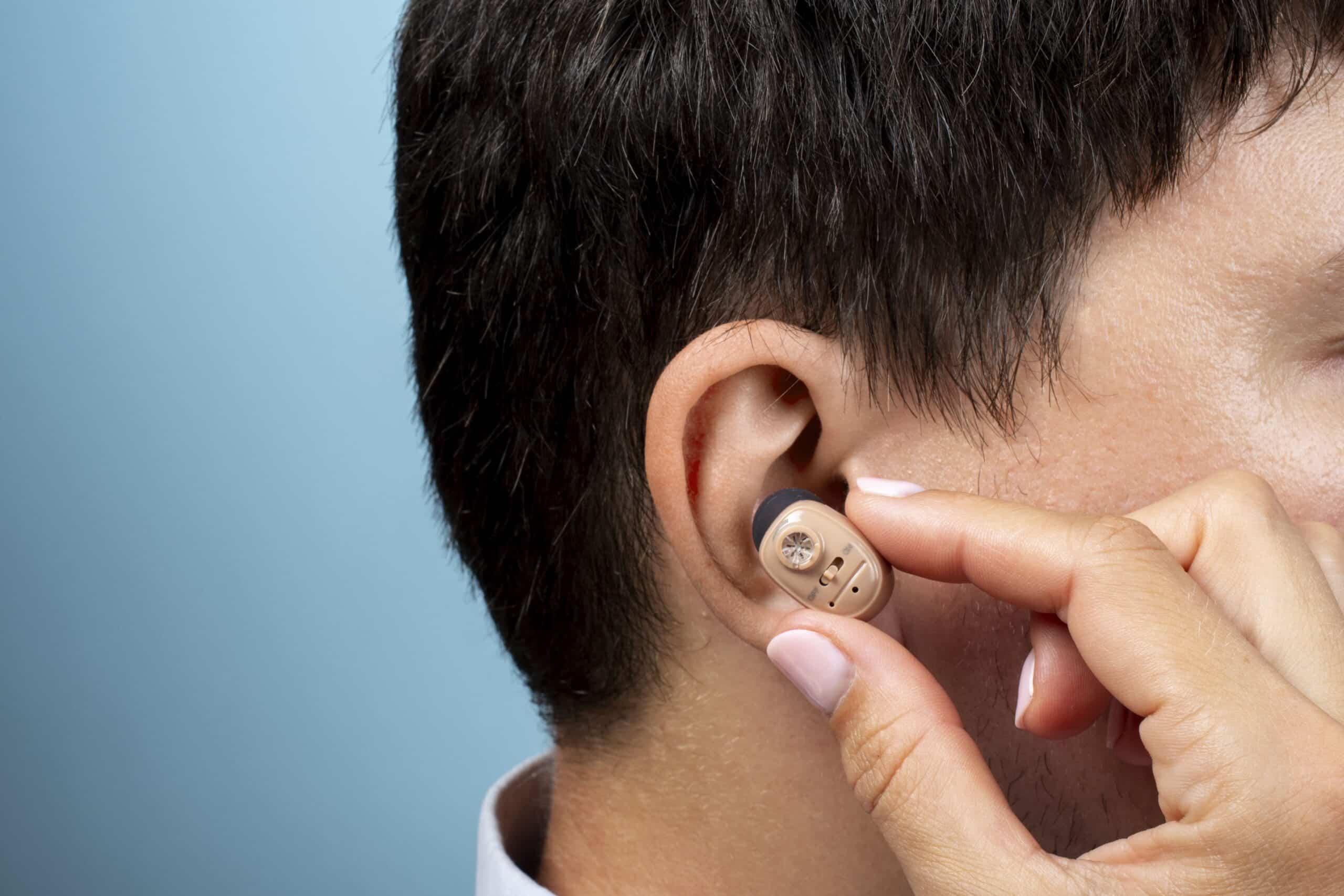Table of Contents
Hearing loss is becoming increasingly common as people get older and have more exposure to noise in daily life. A frequent question that arises is: Can hearing aids prevent hearing loss? While hearing aids are mainly designed to assist those who already have hearing difficulties, recent research suggests they may also help preserve hearing and slow down further decline.
By keeping the ears and brain engaged in processing sound, hearing aids could offer more than just amplification. In this blog, we explore whether hearing aids can protect your hearing, how they work, and what the common myths surrounding their use are.
Understanding Hearing Loss
Before exploring whether hearing aids can prevent hearing loss, it’s essential to understand what hearing loss is and what causes it.
Types of Hearing Loss
- Sensorineural Hearing Loss: Caused by damage to the inner ear (cochlea) or the auditory nerve. This type is typically permanent. Conductive Hearing Loss: Occurs when sound is blocked in the outer or middle ear. Common causes include middle ear infection and ear infections. Learn more about related issues like otosclerosis.
- Mixed Hearing Loss: A combination of sensorineural and conductive hearing loss.
The most common cause of hearing loss in adults is age-related hearing loss (presbycusis), followed by noise-induced hearing loss.
The Purpose of Hearing Aids
Hearing aids are electronic devices that amplify sound. They are designed to make hearing easier, especially in challenging environments like busy restaurants or during group conversations.
Key Functions of Hearing Aids
- Amplify sound frequencies that the user struggles to hear.
- Improve speech recognition and communication.
- Reduce the listening effort required, especially in noisy environments.
Can Hearing Aids Prevent Further Hearing Loss?
The short answer is: hearing aids cannot stop hearing loss from occurring, but they can help reduce the risk of further decline in specific situations. Let’s unpack this.
Preventing Auditory Deprivation
When your ears don’t pick up enough sound over time, the brain’s ability to process sound can deteriorate a phenomenon known as auditory deprivation.
How Hearing Aids Help:
- Hearing aids stimulate the auditory pathways regularly.
- They keep your brain “exercised,” preventing degradation of sound processing.
- They preserve speech understanding by keeping the brain engaged.
This supports the idea that hearing aids are hearing preservation tools.
Preventing Cognitive Decline
Multiple studies have shown a link between hearing loss and cognitive decline, including an increased risk of dementia.
Role of Hearing Aids:
- Help users stay socially active and mentally stimulated.
- Reduce listening fatigue and cognitive strain.
- Support brain health by delivering regular auditory input.
While hearing aids don’t directly stop hearing decline, they offer protection against secondary effects like memory loss, social withdrawal, and mental fog, reinforcing their value as hearing aid protection devices.
Do Aids Stop Hearing Decline?
Let’s revisit this critical question.
- No, hearing aids do not biologically stop hearing loss progression.
- Yes, they may slow functional decline by keeping the auditory system active.
- Yes, they help protect against cognitive and emotional damage caused by untreated hearing loss.
This is why many professionals recommend viewing hearing aids not just as assistive devices but as preventive tools within a broader hearing care strategy.
How Hearing Aids Protect Hearing Health
Noise Reduction Features
Modern hearing aids come with advanced noise reduction and feedback suppression, which protect your ears from harmful loud sounds.
- This feature is especially important in noisy work environments.
- It prevents additional damage from sudden loud noises.
Automatic Volume Control
Some devices automatically adjust volume based on your environment.
- Prevents overstimulation of the ear.
- Ensures sounds are delivered safely and clearly.
Directional Microphones
These focus on speech and reduce background noise.
- Lowers the listening strain.
- Protects auditory nerves by preventing overload.
These technological features make hearing aids effective hearing preservation tools, especially when used correctly and consistently.
When Should You Start Using Hearing Aids?
Many people wait too long before seeking help. By the time they get hearing aids, they’ve already lost significant hearing capability.
Early Intervention is Key
- Using hearing aids early ensures better outcomes.
- It keeps the auditory nerve stimulated and the brain actively processing sound.
Common Myths: Debunking Misconceptions
MYTH | FACT |
Hearing Aids Make Hearing Worse | Properly fitted hearing aids do not damage your hearing. They support your hearing health by reducing strain and enhancing sound clarity. |
You Should Wait Until It Gets Bad | The longer you wait, the more difficult it is to retrain your brain. Starting early improves long-term success. |
Hearing Aids Are Only for the Elderly | Hearing aids are helpful at any age. Many young adults and even children benefit from early hearing support. |
Hearing Preservation Tools
Apart from hearing aids, several other tools and habits can help protect your hearing:
Custom Earplugs
Useful for musicians, construction workers, and anyone exposed to loud environments. They reduce damaging noise while preserving sound quality.
Noise-Canceling Headphones
They reduce ambient noise, allowing you to listen at lower volumes, which helps prevent further hearing decline.
Smartphone Hearing Apps
Modern apps can test your hearing, adjust soundscapes, or even act as assistive listening devices.
Regular Hearing Tests
Annual checks with an audiologist help you track any changes and detect problems early.
Book a professional hearing test, such as:
Choosing the Right Hearing Aid
The right hearing aid depends on your lifestyle, degree of hearing loss, and budget. Some top brands include:
- Starkey Hearing Aids
- Signia Hearing Aids
- Phonak Hearing Aids
- ReSound Hearing Aids
Professional guidance is key; always consult an audiologist to ensure a proper fitting and programming.
Hearing Aid Protection and Maintenance Tips
To ensure your device offers maximum benefit:
- Clean it regularly to avoid wax buildup.
- Store in a dry, dust-free case.
- Replace batteries or charge as needed.
- Get professional adjustments and repairs.
Proper care extends the life of the device and maintains hearing aid protection for years.
Hearing Loss Prevention Tips Beyond Hearing Aids
- Avoid Loud Noises: Use hearing protection in noisy environments.
- Lower Headphone Volumes: Follow the 60/60 rule (60% volume for 60 minutes).
- Stay Healthy: Manage conditions like diabetes or hypertension that affect hearing.
- Keep Ears Dry and Clean: Poor hygiene can lead to infections and hearing issues.
For more on safe ear care, explore how to clean your ears.
Conclusion
Absolutely. While hearing aids can’t reverse damage, they offer a powerful way to preserve what remains, protect against cognitive decline, and enhance quality of life.
They serve as modern-day hearing preservation tools, ensuring that you stay connected to the world around you. With the right technology, early use, and ongoing care, hearing aids can indeed play a role in slowing hearing decline and preserving brain health.
Get started with a hearing assessment at The Hearing Centre.
Frequently Asked Questions
They don’t stop hearing loss entirely, but can slow its progression by keeping the auditory system active.
No, but they amplify sound and make hearing clearer and easier.
You can book a hearing test at The Hearing Centre.
Not at all consistent use is encouraged for best results, which provides long-term benefits such as cognitive support.
Yes, especially those with noise-limiting features and automatic volume control.
As soon as a hearing loss is diagnosed. Early use preserves clarity and slows further decline.
Yes, children with hearing loss benefit significantly from early use of hearing aids.
They reduce risk by keeping the brain engaged, which helps delay cognitive decline.
Every 6–12 months for adjustments and cleaning by a professional.
Basic models can help, but customized options from a certified clinic offer better results.

Evlin is passionate about helping people with hearing loss. With years of experience in audiology, she has diagnosed and treated a wide range of hearing conditions across all age groups. She is accredited to conduct comprehensive hearing assessments and provide treatments for patients from newborns to the elderly. Committed to personalized care, she strives to empower patients to fully engage in life with better hearing.
Designation: Clinical Audiologist
Qualification: Bachelor of Health Science (Honours) (Audiology), University of Science Malaysia
Membership: .Society of Audiology Professionals in Singapore (SAPS)
